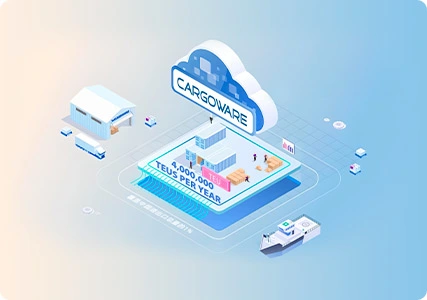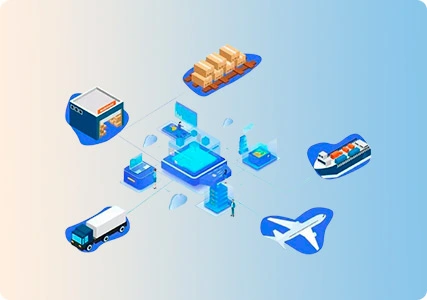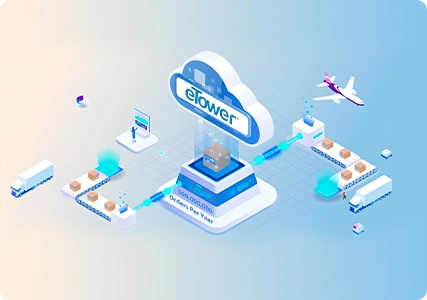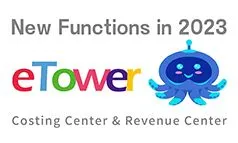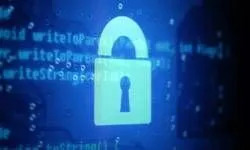
The logistics industry is poised to unlock $1.5 trillion in business opportunities through digital transformation. To capitalize on this, the industry should leverage cost-efficient technologies, optimize transport management, adopt machine-driven process changes, and utilize software-based solutions like AI and blockchain. These advancements have generated a surge in data, which can be analyzed using IoT and AI technologies. By incorporating IoT solutions, businesses can achieve transparent supply chains, reduce costs, and monitor goods in real-time for timely and optimal delivery.
The transport and logistics industry has reaped significant benefits from digital technologies and automation, but it has also become a prime target for cybercrime. The increasing integration of cloud-based systems in the supply chain has raised the risk of cyber security threats. The convergence of traditional IT and unconnected OT systems, along with the expansion of IoT endpoints, has heightened security risks for consumers and businesses. The logistics sector, with its multiple stakeholders and third-party vendors, is particularly vulnerable. Many companies lack the necessary understanding to effectively manage the risks associated with digital advancements and their rewards.
Data in International Logistics that pose security risks include:
1. Customer and Transaction Information: This encompasses personal details like name, address, phone number, email, identification, passport number, business license, contact information, as well as cargo information and logistics requirements. Hackers can exploit this data for phishing and fraud, using fake emails or text messages to deceive customers into divulging sensitive information.
2. Recipient Information: Hackers may leverage this information for social engineering attacks to gather related logistics data. They can also use it to sell counterfeit or similar products in the target market, causing economic and reputational harm to the shipper.
3. Carrier and Cargo Information: This includes the carrier's profile, rates, services, as well as cargo details such as name, quantity, weight, volume, value, origin, and destination. Hackers can exploit this information to impersonate carriers or sell fake carrier services, deceiving others for financial gain.
4. Transportation and Shipping Information: This involves logistics routes, mode of transportation, departure and destination locations, loading and unloading details, transportation tools, costs, customs fees, insurance, shipment tracking numbers, shipping dates, and arrival dates.
How to secure and reliable software for logistics companies
1. Access Control and Permission Management: Choose software that allows you to set access control and permission management to restrict unauthorized access. This ensures data security and privacy. Additionally, opt for solutions that provide flexible permission management based on employee responsibilities and tasks to prevent data leaks and operational errors.
2. Encryption and Decryption: Look for logistics software that utilizes data encryption technology during cross-border transfers. This ensures the security of transmitted data. It's also important to choose software that has corresponding decryption plans in place to guarantee data security and reliability. For example, software that uses SSL protocols for encrypting data during transmission.
3. Backup and Recovery: Prioritize software that includes regular data backup functionality to address potential data loss or leakage. Additionally, ensure the software for freight forwarding companies offers a robust data recovery plan to facilitate timely data restoration in the event of an attack or accident. Consider solutions that store copies of data in alternative locations, such as a unique server base, so that even if one cloud storage fails, the information remains protected.
4. Standards and Protocols: Verify that the software provider complies with IT standards and protocols, such as ISO 27001 for information security management systems. Choose a system provider that holds internationally recognized industry certifications to ensure they meet stringent security requirements. Additionally, ensure that the system operations service team or company you select is well-informed about risks and receives proper training, guaranteeing the implementation of comprehensive system risk management measures.
eTower's Role Management Function enables comprehensive control and management for different roles, including:
1. System Administrator: Full system access and control over settings, permissions, security policies, and logs.
2. Shipper: Permissions for data queries and essential operations like order creation, tracking, labeling, and forecasting.
3. Operator: Responsible for parcel/cargo handling, including scanning, weighing, sorting, and loading.
4. Integrator: Manages transportation, line-hauling, customs, and last-mile delivery.
5. Sales Personnel: Handles customer communication, order management, and payment processing.
These role-based permissions ensure efficient and secure data management within the logistics system.
As a multi-tenant Saas service provider, eTower provides comprehensive security protection for logistics service providers and cross-border e-commerce logistics businesses:
1. Diversified virtual and physical Data Protection: encryption & decryption, cloud server (provided by AWS), and unique database.
2. AWS Advanced Technology Partner Qualification (Chinese)
AWS Partner (Amazon Web Services) - WallTech, eTower's parent company, holds the Advanced Technology Partner qualification from AWS. The Advanced level is Amazon's highest partnership level, it is awarded to companies that have demonstrated a high level of expertise in integrating their technology with AWS services. This also guarantees third-party penetration testing while ensuring timely access to security intelligence and technology.
3. ISO 27001 Certification
ISO 27001 Certification is an internationally recognized standard for Information Security Management Systems (ISMS) developed by the International Organization for Standardization (ISO) and the International Electrotechnical Commission (IEC). The standard provides a comprehensive framework for managing and maintaining an organization's information security risks, encompassing people, processes, and technology.
4. Dedicated IT Team and process deployment: effectively addressing various security threats effectively and immediately 24x7.
